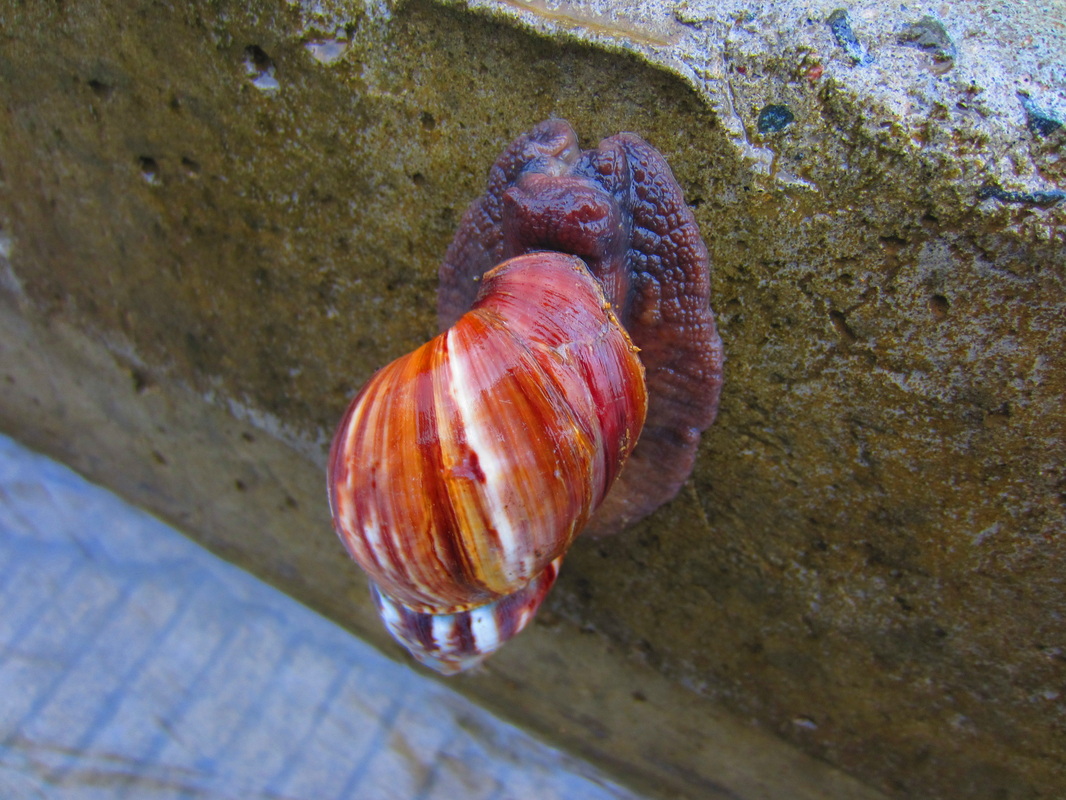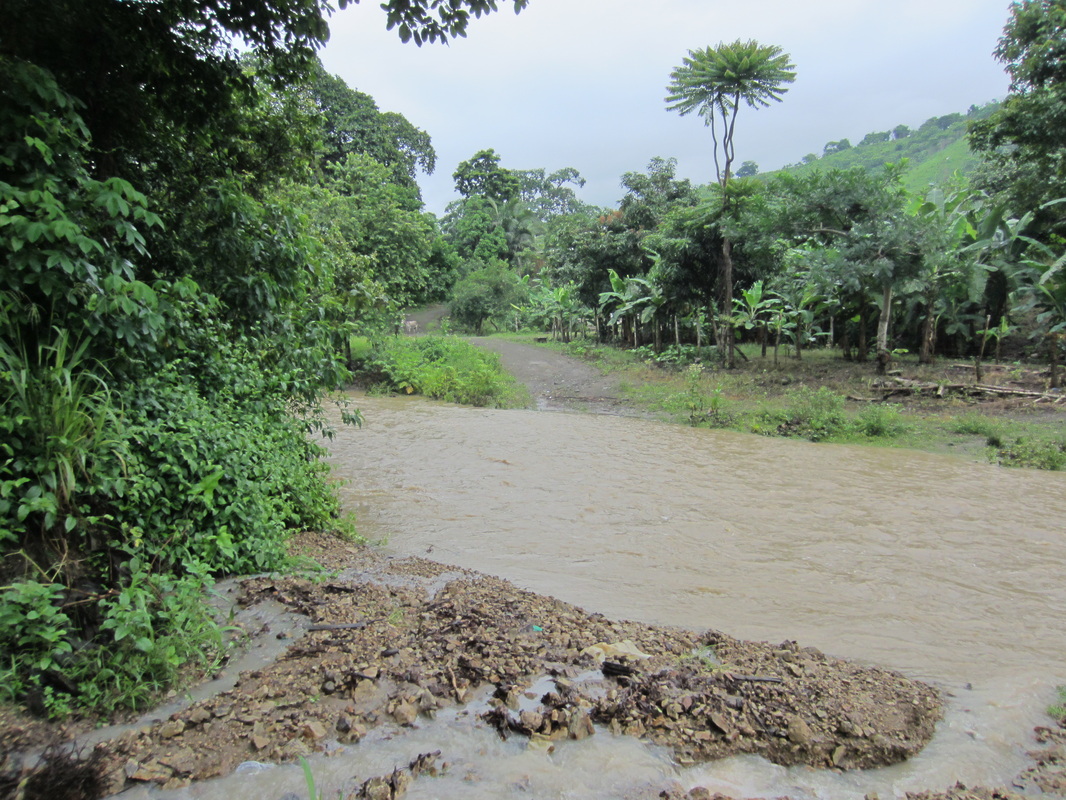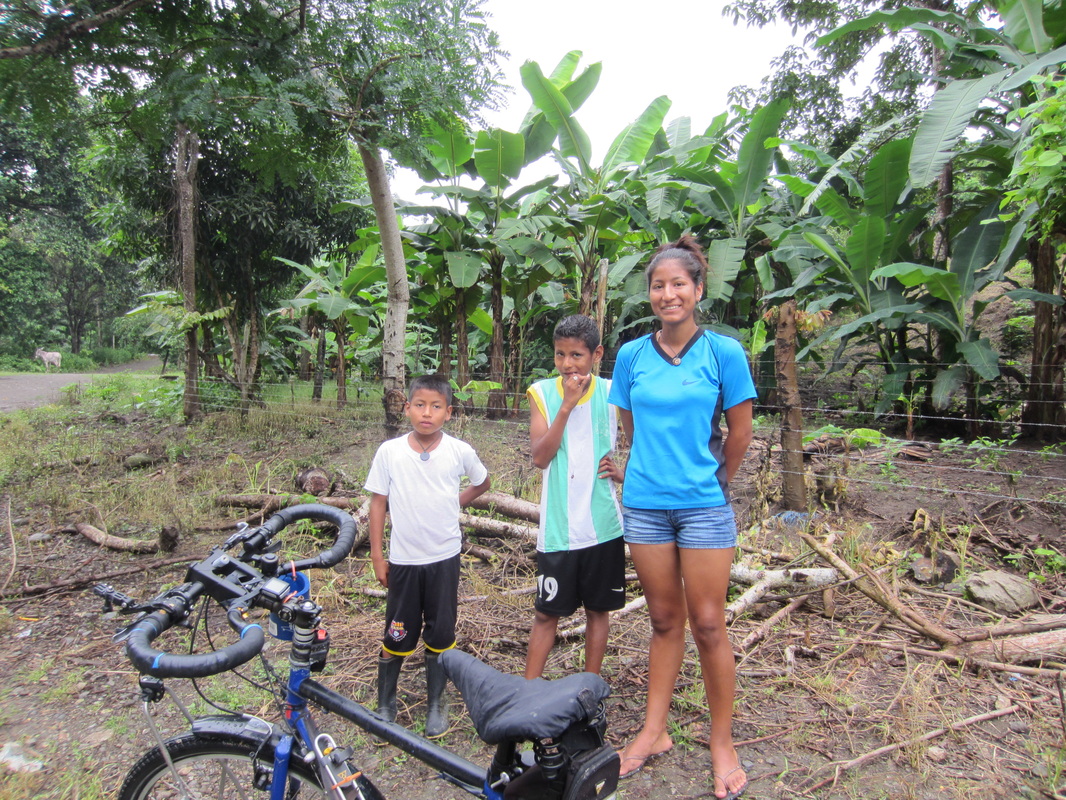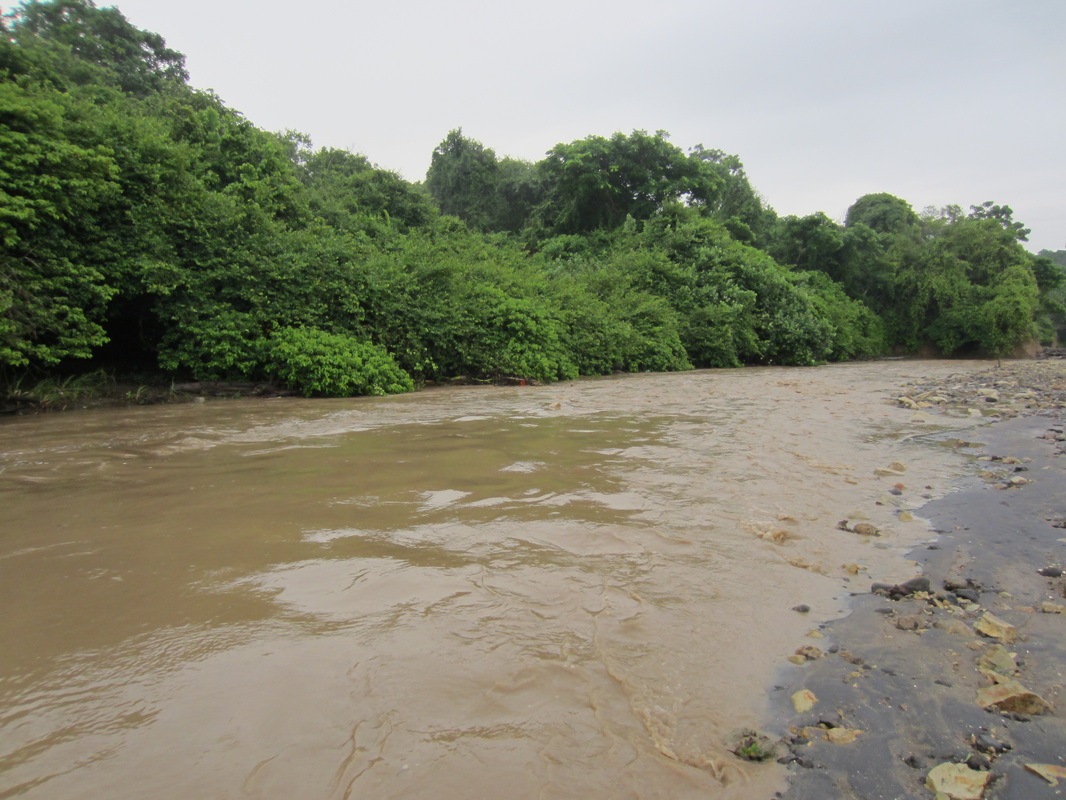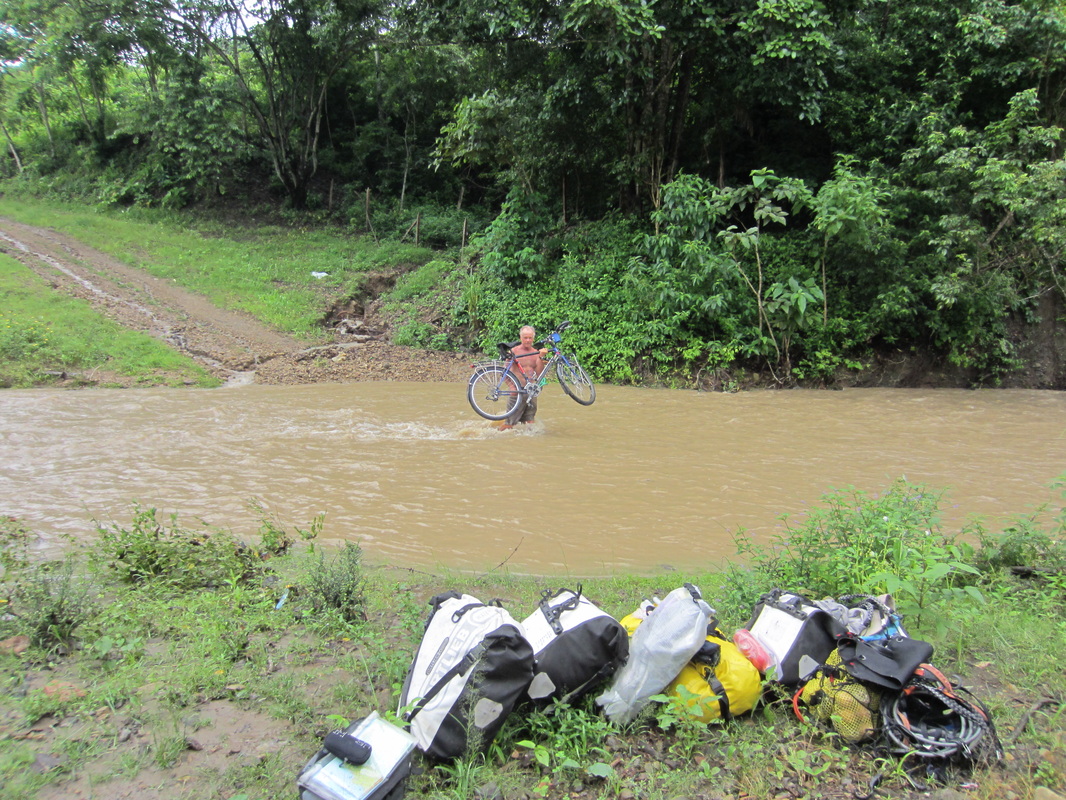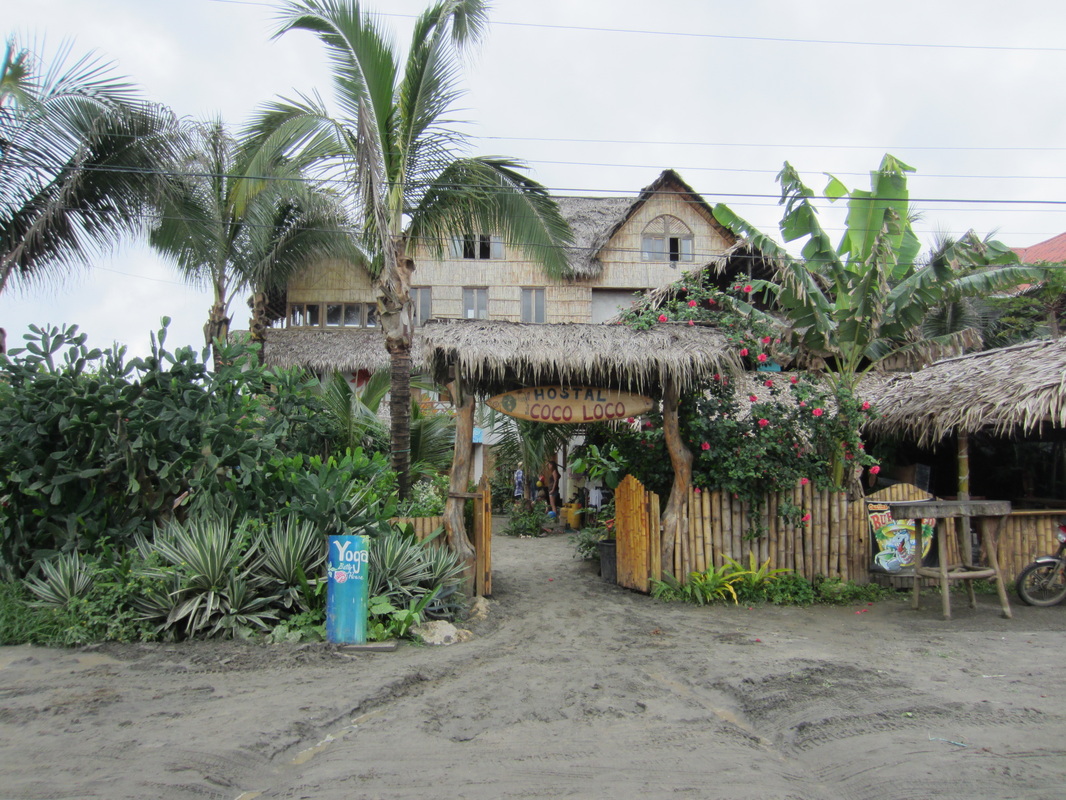3,4/3/2013 Tabuga to Canoa
D70, T4, av17.03, Max58, Tot 11900,1682
Rain started 0800 all the way to Canoa
Getting up, the first thing noticed was how much the creek had come up, it wasn’t far short of a raging torrent. It must have poured up stream during the night.
I had to make the decision whether or not to stay put or go back to the creek crossing and wait it out, till the creek level lessened.
The rain stopped, so a coffee was made and the decision taken: saw me pack up and head back to the creek. Taking advantage of the dry spell.
I also needed water.
With water everywhere on the track, the bike wheels were kept in the watery rutts which consequently kept them mud free.
Getting back to the gate and the house, the owner said the river goes down fairly quick.
So finally back at the crossing.
What was yesterday a tranquil scene with women doing their washing on the rocks was now a brown torrent.
Living in a subtropical environment , I was well aware of the dangers of tackling swollen rivers no matter how small. Many people had meet with grief this way during times of flood on the north coast of NSW in Australia.
I was also aware that this was not a weekend excursion and things could be replaced once the sanctuary of home was reached,no, there was no room for error here.
I walked across to check the depth , it was now thigh deep. To safely cross, one had to walk down stream during the passage, to lessen the force of the current. Luckily the river bed consisted of smallish stones, this made the crossing without getting a drenching more likely.
Many years ago while trapping possums in the bush after having been helicoptered in.
I had to cross the Ruakaturi, river in the Ureweras every day, its bed consisted of large rocks, that crossing was always just short of a drenching.
Feeling it was safe to carry each pannier over individually, this was done. In about half an hour all was thankfully dry and on the useful side of the creek.
A lesson was learnt here without too much drama.
That being, don’t cross creeks to camp for the night in Ecuador during the wet season.
If I hadn’t been able to cross, camping on the edge would have been better than the beach as I was in a position to ford it as soon as the level dropped.
From here, the chain was put back on and the highway once again followed.
Chicken soup was enjoyed not far down the road, it was the first place the guy over charged me, it was disappointing, he was a good guy. The transaction proceeded without me commenting.
The E15 is such a pleasure to ride.
Long distance cycling affords certain intimacy with the road for me.
An intimacy where the road reveals much about itself, it is a place where many animals meet their maker. The E15 had claimed many frogs and these large snails. There are interesting smells revealed during this slow passage. Those of agricultural activities along its edges, those of spent fuel needed to propel other modes of transport those of food cooking nearby, to mention a few.
Always as the kilometres were left behind, the ways in which the road had changed the environment were pondered, a lowland bisected here, a hill gouged there, water directed to different places. The earth and the organisms below it never to see the light of day again, forever being compressed.
The noises of birds and frogs and the peacefulness few other vehicles made for a thoughtful journey alive with dreams and schemes.
Teak trees were growing in all their glory on the roadside. Their leaves reaching gigantic proportions in this relatively unpolluted tropical environment. They were enjoying luxury uptake. A young guy on a horse rode with me for a few kilometres, we had a good old chat, he rode the earthen nature strip. He was riding a horse with no name. These words too, bring back memories.
The rain soon started and never let up, not heavy just relentlessly wet. It was enjoyable riding, better wet from rain than sweat, though it was a case of both.
The temperature of both the atmosphere and the rain was perfect, warming and yet refreshing.
When stopping for a drink and three are enjoyed in rapid succession, I knew perspiration was a large ingredient of my drenched body and clothes.
Road works were encountered before Jama, gravel but no problem to my 2” tyres.
Incidentally this road has only been in use for 3 years.
The plan was to spend the night at Canoa and dry some gear.
On arrival it could be seen it was a backpackers favorite. Heading into town the road to the foreshore was followed, some locals were asked about the going rate for a bed, "quince, veinte dolares" was their reply, "muy caro y muchas gracias" was my reply ,we laughed and I rode on.
The beach front road was of sand with assorted stalls and bars on the beach side with restaurants and hostels on the right side riding south. It was raining hard.
Though this time of year is the wet season, now till into April, if you were trying to sell raincoats or gumboots, you would go broke. There would not be an item of clothing that could keep you dry with the humidity and rain here.
Few people wore such attire.
Backpackers and other travelers were making tracks in all directions.
The sea was ochre and burdened with large pieces of timber floundering in its waves. It was favorite with surfers.
Last night, here too, received a huge amount of rain.
A room was booked at the Coco Loco hostel, people were everywhere it was a laid back affair. A ground level room was snagged.
Unpacking and chatting with a few people, I headed over the road for a cerviche.
The afternoon was spent over a couple of beers and cards. We played the national card game Cuarenta. It is a great game with interesting rules and a very different scoring system. With four it is played by 2 teams.
Lots of Canadians are here, all fleeing that winter of theirs.
Still it rained.
4/3/2013 Canoa all day
Everything was damp with the relentless rain. I took the bus to San Vicente south of here across from Bahia de Caráquez to visit n ATM.
An email from Devin onformed me that the Poles we met were held up in Southern Colombia due to road blocks by the coffee growers demanding more compensation for their efforts. The excerpt below is from an article on the net.
Coffee growers in Colombia, the world’s top producer of high-quality Arabica beans, are demanding more help from the government after being hit by years of poor weather, crop disease and a strong currency.They have been blocking key highways and secondary roads since Monday, especially in the coffee producing provinces of Huila and Cauca.
The rest of the day was spent hanging about at the hostel chatting with people and going to the beach between showers.
One young Israeli guy was talking about buying canoe and paddling from Ecuador to Brazil. Gotta have dreams!!
D70, T4, av17.03, Max58, Tot 11900,1682
Rain started 0800 all the way to Canoa
Getting up, the first thing noticed was how much the creek had come up, it wasn’t far short of a raging torrent. It must have poured up stream during the night.
I had to make the decision whether or not to stay put or go back to the creek crossing and wait it out, till the creek level lessened.
The rain stopped, so a coffee was made and the decision taken: saw me pack up and head back to the creek. Taking advantage of the dry spell.
I also needed water.
With water everywhere on the track, the bike wheels were kept in the watery rutts which consequently kept them mud free.
Getting back to the gate and the house, the owner said the river goes down fairly quick.
So finally back at the crossing.
What was yesterday a tranquil scene with women doing their washing on the rocks was now a brown torrent.
Living in a subtropical environment , I was well aware of the dangers of tackling swollen rivers no matter how small. Many people had meet with grief this way during times of flood on the north coast of NSW in Australia.
I was also aware that this was not a weekend excursion and things could be replaced once the sanctuary of home was reached,no, there was no room for error here.
I walked across to check the depth , it was now thigh deep. To safely cross, one had to walk down stream during the passage, to lessen the force of the current. Luckily the river bed consisted of smallish stones, this made the crossing without getting a drenching more likely.
Many years ago while trapping possums in the bush after having been helicoptered in.
I had to cross the Ruakaturi, river in the Ureweras every day, its bed consisted of large rocks, that crossing was always just short of a drenching.
Feeling it was safe to carry each pannier over individually, this was done. In about half an hour all was thankfully dry and on the useful side of the creek.
A lesson was learnt here without too much drama.
That being, don’t cross creeks to camp for the night in Ecuador during the wet season.
If I hadn’t been able to cross, camping on the edge would have been better than the beach as I was in a position to ford it as soon as the level dropped.
From here, the chain was put back on and the highway once again followed.
Chicken soup was enjoyed not far down the road, it was the first place the guy over charged me, it was disappointing, he was a good guy. The transaction proceeded without me commenting.
The E15 is such a pleasure to ride.
Long distance cycling affords certain intimacy with the road for me.
An intimacy where the road reveals much about itself, it is a place where many animals meet their maker. The E15 had claimed many frogs and these large snails. There are interesting smells revealed during this slow passage. Those of agricultural activities along its edges, those of spent fuel needed to propel other modes of transport those of food cooking nearby, to mention a few.
Always as the kilometres were left behind, the ways in which the road had changed the environment were pondered, a lowland bisected here, a hill gouged there, water directed to different places. The earth and the organisms below it never to see the light of day again, forever being compressed.
The noises of birds and frogs and the peacefulness few other vehicles made for a thoughtful journey alive with dreams and schemes.
Teak trees were growing in all their glory on the roadside. Their leaves reaching gigantic proportions in this relatively unpolluted tropical environment. They were enjoying luxury uptake. A young guy on a horse rode with me for a few kilometres, we had a good old chat, he rode the earthen nature strip. He was riding a horse with no name. These words too, bring back memories.
The rain soon started and never let up, not heavy just relentlessly wet. It was enjoyable riding, better wet from rain than sweat, though it was a case of both.
The temperature of both the atmosphere and the rain was perfect, warming and yet refreshing.
When stopping for a drink and three are enjoyed in rapid succession, I knew perspiration was a large ingredient of my drenched body and clothes.
Road works were encountered before Jama, gravel but no problem to my 2” tyres.
Incidentally this road has only been in use for 3 years.
The plan was to spend the night at Canoa and dry some gear.
On arrival it could be seen it was a backpackers favorite. Heading into town the road to the foreshore was followed, some locals were asked about the going rate for a bed, "quince, veinte dolares" was their reply, "muy caro y muchas gracias" was my reply ,we laughed and I rode on.
The beach front road was of sand with assorted stalls and bars on the beach side with restaurants and hostels on the right side riding south. It was raining hard.
Though this time of year is the wet season, now till into April, if you were trying to sell raincoats or gumboots, you would go broke. There would not be an item of clothing that could keep you dry with the humidity and rain here.
Few people wore such attire.
Backpackers and other travelers were making tracks in all directions.
The sea was ochre and burdened with large pieces of timber floundering in its waves. It was favorite with surfers.
Last night, here too, received a huge amount of rain.
A room was booked at the Coco Loco hostel, people were everywhere it was a laid back affair. A ground level room was snagged.
Unpacking and chatting with a few people, I headed over the road for a cerviche.
The afternoon was spent over a couple of beers and cards. We played the national card game Cuarenta. It is a great game with interesting rules and a very different scoring system. With four it is played by 2 teams.
Lots of Canadians are here, all fleeing that winter of theirs.
Still it rained.
4/3/2013 Canoa all day
Everything was damp with the relentless rain. I took the bus to San Vicente south of here across from Bahia de Caráquez to visit n ATM.
An email from Devin onformed me that the Poles we met were held up in Southern Colombia due to road blocks by the coffee growers demanding more compensation for their efforts. The excerpt below is from an article on the net.
Coffee growers in Colombia, the world’s top producer of high-quality Arabica beans, are demanding more help from the government after being hit by years of poor weather, crop disease and a strong currency.They have been blocking key highways and secondary roads since Monday, especially in the coffee producing provinces of Huila and Cauca.
The rest of the day was spent hanging about at the hostel chatting with people and going to the beach between showers.
One young Israeli guy was talking about buying canoe and paddling from Ecuador to Brazil. Gotta have dreams!!
|
|
